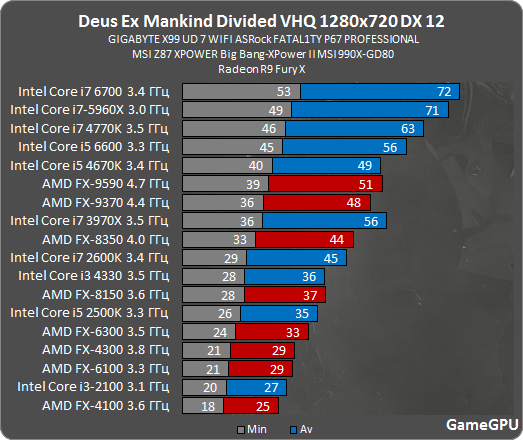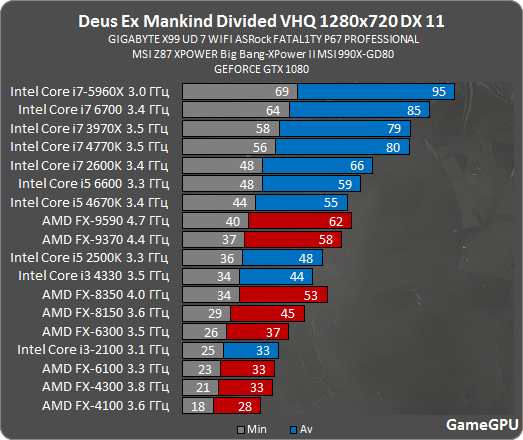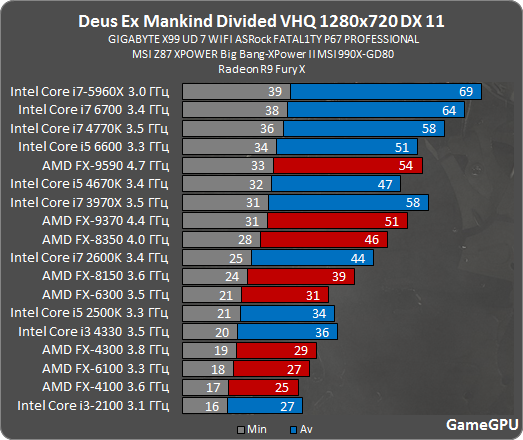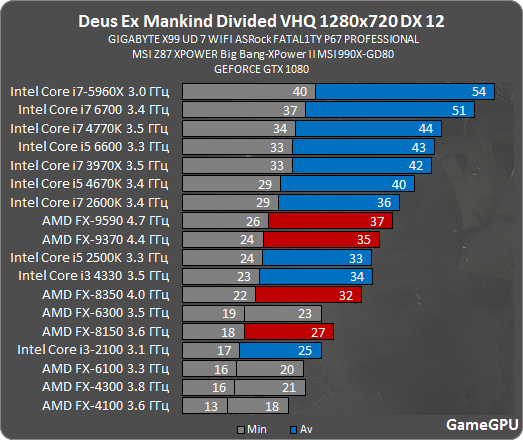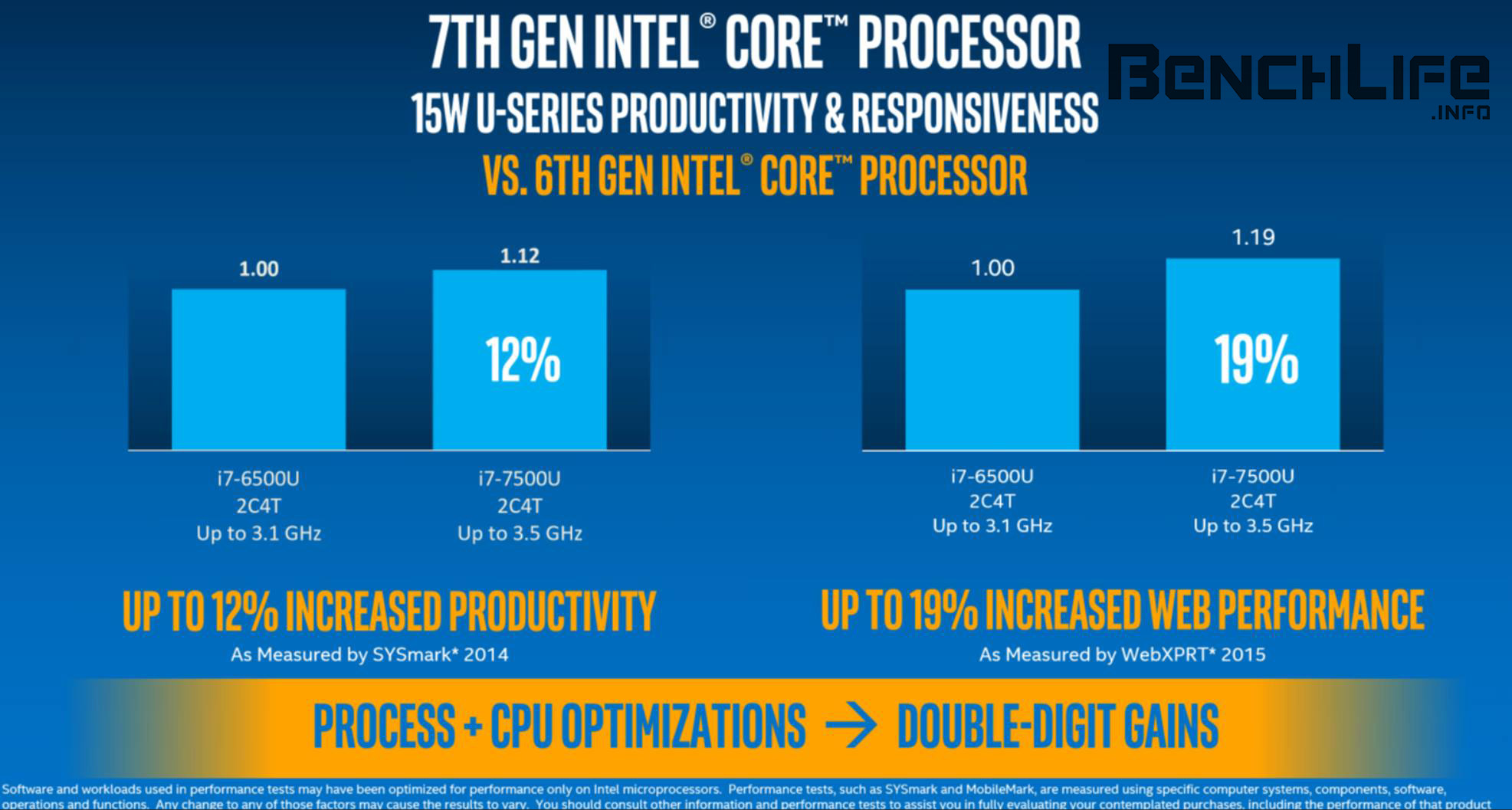No, you are misunderstanding what Kaby Lake is. Kaby Lake is the same micro-architecture (more or less) as Skylake, but the actual circuit design is improved and it is manufactured on an enhanced 14nm process. It's not just pre-overclocked/cherry picked Skylake chips.
I am not misunderstanding KBL.
If both processors max out at roughly similar overclocks of 4.7-4.8Ghz, the enhanced 14nm process is a marketing gimmick that may translate in 5-10W reduction in power usage. If 7700K can consistently overclock to 4.9-5Ghz or can overclock to 4.7-4.8Ghz on stock voltage, then I will agree with you. Until we see any proof that 7700K is actually a better processor when maxed out than 6700K is, your posts are just conjecture unless you have insider info. Considering how much of an overclocking flop BW-E ended up, I am inclined to be cautious than lap up Intel's marketing claims of enhanced 14nm node. The faster iGPU performance is useless for most of us with dedicated GPUs w/ HDMI 2.0 and all that 4K decoding jazz. Besides, anyone who cares about high quality video encoding isn't using iGPU/GPUs for it but MOAR cores. In that case, 7700K will bring nothing to the table as it's still a quad core.
As it stands, per Silicon Lottery:
"As of 5/3/16, the top 59% of tested 6700Ks were able to hit 4.7GHz or greater."
They sell a
4.7Ghz 6700K for $339.99.
We'll see what Kaby Lake brings to the table for desktop overclockers, but for mobile it's a clear win: much higher clocks in the same power envelope + improved media engine.
I didn't say anything about mobile parts. My issue was with a generalized statement of how KBL would bring 10-25% performance boost, while ignoring the most important market segment for this forum - desktop - aka i7 6700K/i5 6600K.
If you want to talk about mobile, it's been 3.5 years since I purchased my Ivy Bridge i7 3635QM laptop. Its spiritual $378 SKU Skylake replacement,
the 6820HQ, is only 20% faster (
92.8 rating vs. 77.1 rating). By February 2017, my laptop will be 4 years old. You think it's something to celebrate that a mobile Kaby Lake may add another 200-300mhz on top of the 6820HQ after
another year? At this pace it's going to take until late 2018 before there is a 45W TDP mobile i7 that's 40-50% faster than my Winter 2013 Ivy.
That's another issue with Kaby Lake -- it's not a new architecture/generation. For someone with a fast laptop, such as mine, it's still worth skipping and waiting until Ice Lake in 2018 or even beyond. Unless gaming or needing a new laptop for better battery, Intel is not providing enough of a CPU increase in the mobile space to warrant upgrading.
It's actually SKX-X, not SKL-X

Anyway, SKX-X should be interesting because it'll be using the Skylake Xeon cores rather than the plain Jane Skylake cores; that means AVX-512 and if David Kanter is right, a larger L2$. I wouldn't be surprised if perf/clock at the core level for SKX-X is higher than SKL-S or KBL-S/KBL-X. [/quote]
By the time AVX 512 is used, we'll be long past the Skylake architecture. Not sure why you are bringing up Intel marketing bullet-points to try and defend the fact that Skylake-X is going to end up 1.5-2 years
behind a 4.6-4.8Ghz i7 6700K.
As far as six core mainstream, it looks to me that Intel's goal is to move enthusiasts from the mainstream DT platform to the enthusiast platform. That's why they are doing an interesting, iGPU-less KBL-X SKU as well as offering the SKX-X parts.
I am not denying that. We'll see how successful they are. MicroCenter in the US makes it possible to buy a good
$75 Z170 board and
a great $105 Z170 board, when paired with a $299.99 i7 6700K. A good X99 board costs
$160 and i7 6800K is $399.99. That means the i7 6700K platform would cost $375-405 but the 6-core last generation's architecture with X99 would cost $560 USD. That's a huge difference that could be used towards a better monitor with GSync/FreeSync, stepping up from RX 480/1060 to the GTX1070, or from GTX1070 to the 1080, setting $ aside for a future GPU upgrade, etc. On a value proposition for gaming, the X99 platform loses badly and I don't see how that would change with a 6-core Skylake. Unless Intel purposely delays Ice Lake beyond 2018, games suddenly start benefiting greatly from 6-8 core CPUs, Intel raises prices on the 4C+HT 8700K to $400-450 USD, SKL-X is going to end up as another waste of $ workstation platform.
A reasonable strategy for a 6700K owner would be to make a platform move to Basin Falls (KBL-X/SKX-X platform) and enjoy the ability to use three generations of processors spanning from high TDP/specially binned quad core parts to very high core count SKX-X parts.
I disagree completely. How is it reasonable to sell a perfectly viable fast 6700K gaming platform and upgrade to the same 2-year-old CPU architecture with more underutilized cores, when Ice Lake -- Intel's next major architecture -- is slated for 2018? Given the current pricing premium for X99 over Z170, it stands to reason that i7 7700K + Z270 will continue to enjoy the same $150-200 pricing advantage over the 7800K 6-fore SKL-X.
In hindsight, the 6700K gamer/user would have enjoyed top-of-the-line performance for 1.5-2 years before SKL-X even drops. At that point, might as well wait for Intel's next architecture (see above).
Your other statement about 3 generations of processors I also don't agree with. To me, despite Intel's marketing games, they have had only 4 true architectures post Core 2 Duo/Quad:
1st - 2008 - Nehalem (i7 920)
2nd - 2011 - Sandy Bridge (i7 2600K)
3rd - 2013 - Haswell (i7 4770K)
4th - 2015 - Sky Lake (i7 6700K)
Next is 2018 - Ice Lake. Everything in between is just "marketing generations." In the past when CPUs evolved rapidly, it would have just been the move from Q6600 to Q9550. Today, Intel would call Q9550 a new architecture like Cannon Lake. Marketing gimmick to get something new for OEMs. Kaby Lake is even worse than Q6600 to Q9550 because Intel actually improved the architecture of Kentsfield.
Good times coming for CPU enthusiasts, IMO.
I disagree. Major Intel architectures are exciting. Skylake-X and Kaby Lake-X are the
same underlying architectures, slightly refined 14nm node, some more marketing instructions that won't be used for years to come, and just
MOAR cores. If someone needs a $1000-1800 CPU for productivity, sure, but for gaming, none of these 6-10 core CPUs have proven their worth yet. I recommended i7 5820K for a while because of how grossly overpriced early i7 6700K + Z170 + fast DDR4 combinations were. But at this time, X99 is a waste of $ for gamers (mostly bragging rights and emotions, not perfomrance). If Ice Lake brings a 15% increase in IPC and is priced reasonably, the same will be true for the next workstation platform. The next workstation platform won't even have PCIe 4.0, right?
Good times was when the Enthusiasts received the flagship platform first (
X58 + i7 920/930),
nearly a full year before Lynnfield i7 860 launched. You paid early adopter fees for expensive X58 mobos and DDR3 but the processor only cost $284 and you had 1 year of headstart over the mainstream users. Not only that, but the i7 920 overclocked better on stock voltage and with overvoltage than the i7 860/870/875K/880, it allowed higher safety margin for QPI voltage. Today's workstation Xeon CPUs you show no inherent overclocking advantages. In fact, Broadwell-E overclocks much worse than Skylake or even Haswell-E. Therefore, it's also a stretch to assume SKX-X or KBL-X could even match Ice Lake in overclocking headroom.
Good times was also when the Enthusiasts received the refreshed Ivy Bridge (
X79 + i7 3930K), less than a year after i7 2600K launch. In constrast, you are saying it's good times when SKX-X will launch 1.5-2 years after i7 6700K? That's an even longer delay than in the past. How is someone supposed to be excited about spending $400-1000 on the same architecture almost 2 years later? HA!
What Intel is doing is slowly killing the workstation platform. It's never been worse. I bet i7 5820K users are patting themselves on the back buying that amazing CPU in August 2014.
I love this idea, seriously. For the first time we can have one board and swap CPUs from quad to up to 10 cores. I like it. That was a sweet move by Intel. Actual upgradeability for once. I got a feeling that for a high end gaming rig the sweet spot might be a 6 core rig for the Intel camp this time around.
To me actual upgradeability would be if I could upgrade to new Intel architectures without needing to change the motherboard. I am hesitant to believe that Intel will support anything beyond Cannon Lake on the next workstation platform. Cannon Lake is likely a repeat of what Ivy was to Sandy or Broadwell was to Haswell - nothing special.
Now imaging dropping cash on a new $250 SKL-X mobo and $400-1000 on a new SKL-X/KBL-X CPU and then in 2018, we get Z370 with PCIe 4.0, naturally M.2 PCIe 4.0 SSDs support, another 10-15% IPC from Ice Lake, and all of that for less $. It practically means the next workstation platform will be 'obsolete' tech in a year unless Intel purposely delays Ice Lake or butchers it somehow. When you purchased your 3930K, it was a refreshed architecture of Sandy and it still managed to come out in the
same year as Sandy. You are Moonbogg, you should be pissed as heck that Intel is throwing 2-year-old architecture scraps and on top of it is charging premiums on the mobo and CPU side. But wait, you do get MOAR cores. That's great for 3DMark scores I bet! A $1000 5960X can't even beat a $290 i7 6700. $700 flushed right down the toilet. You think Skylake-X will be any different once Ice Lake shows up?
All this time you were bottlenecking your 980Ti SLI with 3930K while you could have just purchased the i7 6700K in August 2015, overclocked it on water to 4.8Ghz and enjoy the same level of CPU performance in games from 2015 to 2018, skipping Skylake-X and Kaby Lake-X entirely. That is exactly why even more delays for the Intel's workstation platform (X58 - 1 year ahead, X79 - same year as Sandy, and now we are 1.5-2 years late!) makes it an even bigger
failure for gamers than ever. The only purpose of the workstation platform has become more cores for workstation uses/productivity and the rest are bragging rights of having the "best consumer CPU" (only on paper).
I agree 100% with this. Perhaps we'll see 2-3% improvements since they were talking about KBL having "key" performance changes.
There is also the opportunity cost of waiting. If someone was on Nehalem/Lynnfield (i7 920-960/860) or Sandy/Ivy (2500K/2600K/3770K, etc.), then what was the point of waiting for Kaby Lake an entire year and not grabbing an i7 6700K when prices subsided? If the 2600K/3770K gamer skipped i7 6700K, what does 7700K change about the situation? Might as well wait all the way and get a true next generation Ice Lake architecture. In the meantime, those i7 Sandy/Ivy CPUs overclocked to 4.5-4.8Ghz should be good for 1440P + GTX1070/1080 anyway. By 2018, this gamer could do an entire system overhaul with Ice Lake + Volta/AMD's equivalent. With Intel's new strategy of moving from a 2-year to a 3-year architecture cadence, imho, it makes the most sense to upgrade via newest architecture cycles and skip all the refreshes in-between. That's why the next key year for upgrading for Sandy/Ivy users is 2018 Ice Lake, not 2016 Kaby or 2017 Cannon Lake. Those are all derivatives of the same Skylake cores/architectures. Another option could be to wait for clearance of i7 6700K once i7 7700K launches. If i7 6700K drops to $249.99 at places such as MicroCenter, it will be a slam dunk upgrade.



